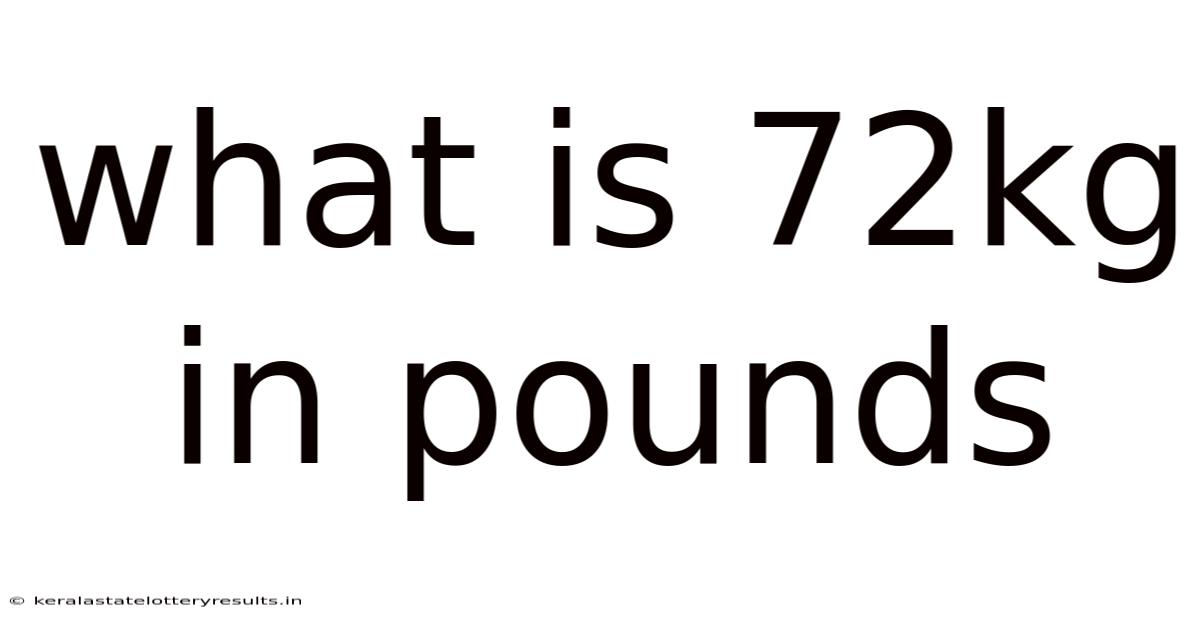What Is 72kg In Pounds
keralas
Sep 15, 2025 · 4 min read

Table of Contents
What is 72kg in Pounds? A Comprehensive Guide to Weight Conversion
Knowing how to convert between kilograms (kg) and pounds (lbs) is a crucial skill in today's increasingly globalized world. Whether you're traveling, following a fitness plan, or simply comparing weights, understanding this conversion is essential. This article will comprehensively explain how to convert 72kg to pounds, delve into the science behind the conversion, address common questions, and provide you with the tools to confidently convert weights between these two common units.
Understanding Kilograms and Pounds
Before we dive into the conversion, let's briefly understand the units themselves. Kilograms (kg) are the standard unit of mass in the International System of Units (SI), also known as the metric system. One kilogram is defined as the mass of a specific platinum-iridium cylinder kept under controlled conditions.
Pounds (lbs), on the other hand, are a unit of mass in the imperial system of measurement, commonly used in the United States and a few other countries. The pound is a historical unit, with its definition evolving over time. Today, it's defined in relation to the kilogram.
Converting 72kg to Pounds: The Simple Calculation
The conversion factor between kilograms and pounds is approximately 2.20462. This means that one kilogram is equal to 2.20462 pounds. Therefore, to convert 72kg to pounds, we simply multiply 72 by this conversion factor:
72 kg * 2.20462 lbs/kg ≈ 158.73 lbs
Therefore, 72kg is approximately 158.73 pounds. While this is a precise conversion, for everyday purposes, rounding to 159 pounds is often sufficient.
The Science Behind the Conversion: A Deeper Dive
The conversion factor of 2.20462 isn't pulled out of thin air; it's derived from the relationship between the kilogram and the pound. The precise definition of the pound is based on the kilogram. Historically, different definitions of the pound existed, leading to slight variations in the conversion factor over time. However, the current definition provides a consistent and universally accepted conversion.
The conversion process is essentially a ratio problem. We establish a ratio of pounds to kilograms, based on the established conversion factor, and use that ratio to convert the given mass in kilograms to its equivalent in pounds. This approach ensures accuracy and consistency in the conversion process. It's the same principle used for converting between any two units of measurement.
Practical Applications and Examples
The ability to convert between kilograms and pounds has numerous practical applications:
- International Travel: Understanding weight limits for luggage often requires conversion between kilograms (used internationally) and pounds (used in some countries).
- Fitness and Health: Many fitness trackers and health apps allow users to input weight in either kilograms or pounds. Understanding the conversion ensures accurate data tracking.
- Shipping and Logistics: Shipping packages often involves weight specifications in both kilograms and pounds, necessitating accurate conversion for international shipments.
- Cooking and Baking: Recipes may be provided in either kilograms or pounds, depending on the region of origin. Conversion ensures accurate ingredient measurements.
- Scientific Research: Scientific research often involves converting between different units of measurement, including kilograms and pounds, for data consistency and analysis.
Addressing Common Questions and Concerns
Q: Why is the conversion factor not exactly 2.2?
A: The conversion factor is approximately 2.20462 because the kilogram and the pound are defined independently, and their relationship is not a simple whole number ratio. Using 2.2 provides a quick estimation, but the more precise factor offers greater accuracy.
Q: How can I perform this conversion without a calculator?
A: While a calculator provides the most accurate result, you can approximate the conversion by multiplying the kilograms by 2.2. This will provide a reasonably close estimate for most purposes.
Q: Are there any online converters available?
A: Yes, numerous online converters are available to perform this and other unit conversions quickly and accurately.
Beyond the Basics: Exploring Other Weight Units
While kilograms and pounds are the most common units for measuring weight, other units exist, such as:
- Grams (g): A smaller unit of mass in the metric system. 1000 grams equal one kilogram.
- Ounces (oz): A smaller unit of mass in the imperial system. 16 ounces equal one pound.
- Stones (st): A less common unit of mass in the imperial system. 14 pounds equal one stone.
- Metric Tons (t): A larger unit of mass in the metric system. 1000 kilograms equal one metric ton.
Understanding the relationships between these different units allows for versatile conversion capabilities.
Conclusion: Mastering Weight Conversion
Converting 72kg to pounds, or any weight between these units, is a straightforward process once you understand the conversion factor. This knowledge is valuable in various contexts, from everyday life to professional applications. By understanding not only the calculation but also the underlying scientific principles, you can confidently and accurately convert between kilograms and pounds. This knowledge empowers you to navigate a globally interconnected world where different measurement systems often coexist. Remember that while approximate conversions are useful for quick estimations, employing the precise conversion factor ensures accuracy in situations requiring precision.
Latest Posts
Latest Posts
-
10 Out Of 15 Grade
Sep 15, 2025
-
Is 41 Composite Or Prime
Sep 15, 2025
-
What Is 20 Of 16
Sep 15, 2025
-
What Is 70 Of 40
Sep 15, 2025
-
5 5 6 As A Decimal
Sep 15, 2025
Related Post
Thank you for visiting our website which covers about What Is 72kg In Pounds . We hope the information provided has been useful to you. Feel free to contact us if you have any questions or need further assistance. See you next time and don't miss to bookmark.